#made it more queer and made some characters more complex
Explore tagged Tumblr posts
Text
(Oo definitely gonna poke at this off and on today between work bear with me :'3) Gonna go from bottom to top cause my brain is my enemy XD
So I was thinking back on the fandom in the past from about the time I noticed the trend.. I have a theory that characterization might have come about from the Dreamwave/ IDW 1 Jetfire, that version of him very well did experience the horrors of war and was kinda more blunt/logical in his words. About the middle of the MTMTE/LL runs, there were lots of fans who were introduced to TF with them. Took a while to see the fandom then branch out to other TF media like G1 & Beast Wars. Interesting to see how more curious & adventurous TFOne wave of fans are. Yall are cool :3
But yah, I noticed the bleh attitude towards Skyfire/Jetfire during those fun little "Robot Husband polls" some people said he'd see "X" as no more than a low life form organic & there were mentions of putting him in the "general cold unempethetic logical scientist" category the fandom liked to generalize with. (Eh that stereotype goes way deeper into other irl subjects. As a queer nerodivergant person in stem... I have ALOT to say on that in separate discussion, but oopf I fear the PissonThePoorWebsite-I already know people will bad faith misread all of this for brownie points. If you do this no cookie for you😭) blah- so I noticed THAT pattern before that with the fandom's mood towards TFA Perceptor where everyone assumed he was a soulless science machine but canonically he deleted MOST (not all) of his PERSONALITY. That's part of what prompted me to share the Complete Allspark Almanac. Well that an the part of the fandom that tried to MTMTE IDWify all iterations of TF canon.. That's a whole other rabbit hole XD
Ha I'll stop here for now on that, my train's derailed! But the fandom's behavior patterns throughout the years has definitely been fun to study. Speaking of, James Roberts mentioned he's writing a TF fandom history zine of sorts. I'm definitely gonna try to pick that up. X3
Back onto Skyfire & Starscream- I agree their relationship is lots more complex than the general "skyfire bad guy he made starscream sad for leaving". SkyStar is one of those ships that can legit one of the best & most fun ones when both characters are respected as complex individuals in a mess of mixed emotions. (ough I'm tryiiing to write them as messy as possible for an au that kinda toys with canon/fanon adjacent with some fanon interpretations being some of Starscream's ideals on their relationship and all. They were married for 10 million years before Skyfire straight up got sick up the monster Starscream became from Megatron & his war)
Ah it's too much to explain in a post but also dont want to on a post that's not mine. Perhaps another time. Gtg for now :'3
Some Starscream fans: Skyfire is waiting for Starscream to come back. He is going to help him leave the decepticons and his love is going to make Starscream redeem himself 🥺🥺
The Fire on the mountain poster:

475 notes
·
View notes
Text
Some people aren't going to like this but whatever:
We need to understand that some of the character development in the harry potter series comes from Jkrs bigotry and prejudices.
Harry stayed with their relatives because Jkr had a very specific model of family in mind and the non normative family models weren't considered good for her.
Remus Lupin's condition was a metaphor for aids and his character and Greyback's were portrayed as the duality: the bad werewolf who targets children on purpose, and the good werewolf that doesn't trust himself to be around children. Which is just another derogatory analogy to emphasize that even good people with a disease aren't good enough to be in society.
—This thing really annoys me because Remus was one of the best teachers and had the potential to be the emotionally stable character that provides a safe space for young people (a safe space that he only had with the marauders when he was younger) and helps to combat the idea that discriminated people (an queer people) shouldn't be around kids (The prisoner of Azkaban could have end with all the students fighting to keep Remus as a teacher, even as a tutor or something but noooo). Also him staying in Hogwarts and watching Dumbledore's behaviour towards Harry the next years maybe would have made him change his point of view or even make him doubt if that approach was the correct one with a kid (obviously I would have love for him and Sirius to adopt Harry but not everyone thinks the same).
Every woman got villanaized without exception. The ones that were "too feminine" even when they were teenagers were treated poorly as well as the older masculine woman. Rita Skeeter was described as an older woman with masculine traits targeting minors (which could be read as if you aren't portraying traditional roles you're a threat for children and society too).
Womanhood was only represented by the evolution of the madonna whore complex: craziness or motherhood. The ones that were in the mother role were the good ones and the ones that ended being too awkward, too weird or too crazy were villains. Even Hermione ends up constrained in the mother role and Tonks (who was a really good potential for a non conforming character) has the same end, but even before that she was placed in the big sis role with Ginny and Hermione.
The lack of poc characters is disappointing but the way their personalities are based on racist stereotypes and prejudices is disgusting. Not only the names but the way they could have had a major role in the series and explore a different ending or evolution thanks to their experiences bothers me so much. Kingsley was a great wizard and could have done more things than "follow Dumbledore's last instructions". As an outsider from Harry's family group he could have seen the things way more objectively and argued that maybe a 16 yo child wasn't safe enough and that the whole plan had so many holes. Also him befriending Remus could have had a major impact in the way werewolves are seen and, again, as an outsider from the marauders group, make him see that he was worth it of love and compassion. But no, Kingsley was just there to be the poc character with good morals on screen with 0 character development.
Cho (omg I despise the way she was written and treated) could have been the "emotions are valid" character that pushes their mates to confront their fears. She was placed in Ravenclaw just because of the "smart Asian" stereotype, but as Cedric's love interest it could have had more sense for her to be in Hufflepuff (they shared a common room so they had things in common and spent time together). And in the fifth book, while she was in mourning she could have been a decisive element for Harry's feelings to not be hidden. We all know Harry had severe emotional problems and a character embracing their own and helping a friend to express more than anger would have been so important, especially for a kid that was treated almost as an adult because he was the key for an imminent war. So this bonding could have been a really good one, and with Luna's appearance the stereotypical trio could have had a better relationship with femininity and softness (a thing that could have helped Ron's and Hermione's insecurities too) and Harry could have learnt how to recognise and comfort his two best friends feelings.
I could keep putting examples but I don't want to make this too long. If you're interested in a deeper and extended explanation let me know <3
#harry potter#marauders era#remus lupin#cho chang#luna lovegood#wolfstar#dead gay wizards from the 70s#fuck jkr#anti jkr#harry potter series#marauders#sirius x remus
82 notes
·
View notes
Note
PLEASE tell me about your Arrigal because I’m obsessed w him
Alright okay wow sure!
Arrigal Kaldera is the second son of a prominent Vistani family. Like every member of his immediate family, he is a werewolf.
With his older brother as the head of the family, Arrigal was largely sidelined and left to his own devices, which suited him just fine. It allowed him to get away with not having a wife and kids, and leaving most of the whole serving Strahd business to other people.
Still, when push comes to shove, he will take on responsibility, often more than necessary.
When he came home from gallivanting on the Prime Material Plane and found his family had kidnapped a local child in order to blackmail its family, he took it upon himself to set things right, both for the sake of the boy and his family. Unfortunately, things went very wrong.
The consequences were dire - for everyone involved.
Plagued by guilt, he now avoids responsibility even more than before, but it seems he can neither escape the consequences of his actions nor fate itself.
And then there is the arrival of a group of adventurers who appear to be tied to the fabric of Barovia itself. A chance encounter with them led to an unusual friendship, especially with the cleric Galen, who knows a monster when he sees one, yet seems to see someone capable of kindness and tenderness when looking at Arrigal. (Homosexual behavior tbh)
As the story unfolds, he finds himself thrust both into the role of a leader and a slave, with more responsibility and less agency than ever before in his life.
(Ooff. Sorry that got long. I turned Arri into a stupidly complex character and this isn't even half of what's going on with him. A lot of his story is still spoilers, while other parts are tied to van Richten,Strahd and Ezmeralda)
#Curse of Strahd#arrigal#Cos: TGT#Curse of Strahd: The Golden Thread#i changed like 90% of the original story#made it more queer and made some characters more complex
8 notes
·
View notes
Note
Is there any list of stuff you wanted to see more in autistic representation? I'm autistic and I'm quite "stereotype material": white savant male good at STEM and who's not aroace but don't want a partner, and it bugs me that it's always like that, so I wanted to know what other people would like to see when I try writing autistic people.
Hi!
Honestly, I just want more autistic characters in general. There are hardly any!
Here are some things that I have never seen represented:
characters with mid-high support needs, both related and unrelated to autism
characters who use AAC [link to post about high/low/no tech aac] and who struggle to communicate
characters with cerebral palsy, tourette's, intellectual disability, or any other common comorbid condition that's not ADHD
characters who don't live with their parents
characters who don't infodump or know a lot of facts about their special interests, just that their interests are the things they engage with
characters whose special interests aren't "useful" to their life
characters with "unusual" sensory needs (for example i always see characters who hate loud noises and bright lights, but i know many autistic people in real life who are not bothered by those or actively seek them out)
characters misdiagnosed in childhood with ODD or another common misdiagnosis, or neglected as a "difficult kid" even if they have higher support needs
characters who use gait trainers, adaptive strollers, or manual tilt in space chairs
characters who have a supportive community or know multiple other autistic people
adult characters in day programs
queer characters, especially ones whose sexuality or gender is difficult to separate from their autism
characters who have harmful stims and not only when they're upset
characters who are not big. (this might seem weird but there are a surprising number of tall/large/imposing autistic characters, especially those with higher support needs; that's not what every autistic person looks like!)
So Many More!! If every autistic writer made a character who was just like them, each one would have at least one autistic trait that has not been represented before.
Mod Rock
Hello!
To be honest, just characters that don't generalize autism. On one hand you have "representation" that's all "all autistics are boys, 12 or under, who like trains and barely speak" and on the other you have "hi, I'm a very low/no support needs autistic who is very socially acceptable and lol like imagine liking trains instead of having Real and Cool special interests like me" (sometimes it's overdone to the point the character quite literally doesn't have any autistic traits). Too much autistic representation made to combat a specific stereotype just ends up shitting on the people who do in fact exist. Some people say that "ahh all autistic rep is those damn boys with they trains!!" but I don't think anyone would say that this kind of representation is actually good or thoughtful - not because of the train or the boy, but because these characters are barely treated as humans most of the time.
We need more complex representation of all parts of the spectrum, from successful savants in STEM to "obviously disabled" autistics who are intellectually disabled, have huge mobility delays, and stim at all times, to "everyday" people who just have their special interest, don't get social cues, and are kinda awkward.
I'll take a "stereotypical" character that's actually explored and developed properly over a cardboard that's there to be a "subversion of autistic stereotypes" any day.
mod Sasza
Hi,
I largely agree with the mods above. Mostly I want autistic characters treated like people and not plot devices.
But I wanted to say specifically: I want autistic characters of color. I am basically begging to see more autistic characters who are not just white people. We exist too, and really I barely see characters who have autism and aren't white.
Also, I want to see autistic characters with romantic and/or sexual partners. I feel like autistic characters are often desexualized or infantilized in a way that has them only rarely having a partner.
And I also want to see autistic characters whose special interest[s] isn't "useful" to their life, it's just there. Just part of their life. Like, it isn't their job. I feel like that's often a default.
Like Sasza said, we really need more complex and thoughtful representation of the spectrum. I don't need 'subversion' of autistic stereotypes, not particularly.
The subversion itself would be an autistic character being more than a plot device and portrayed with thought and care to the things that make their life difficult, the ways their autism affects the way they interact with others and the world, the things that make the person unique and themselves, and not just focusing on one of those aspects and ignoring everything else.
Hope this helps,
mod sparrow
325 notes
·
View notes
Text
Fangs of Fortune (Bai Ze Ling): perfect on pure aesthetics alone, but also it will tear your heart out while being very gay.

I was lured in to this show by Tumblr gifsets and friends on Bluesky talking about how queer and poly this show is. I'm old and I've been in fandom more than half my life. I know how to read queer subtext. I'm also pretty well versed in cdramas, so again, I know how to read subtext. So I went into this ready to, well, read the subtext.
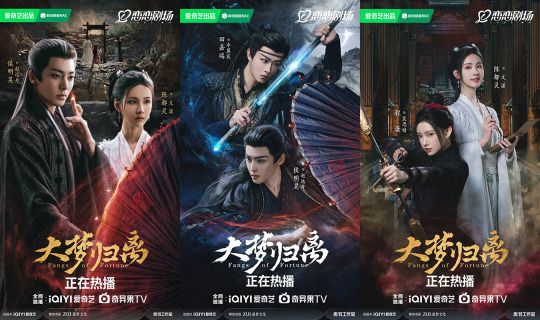
But no this show is just puts the queer it right there in the text. The vague information we have about Chinese censorship repeatedly left me asking, 'wait how are they getting away with this?' Like some of these jokes and implications are just so blatant it seems incredible this show ever made it to being broadcast. It just feels very much like queer media made for queer people even if t's more subtle than something western like Queer as Folk.
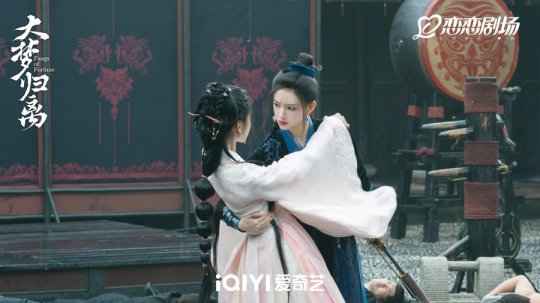
Even without the heavy coloring of gay this show is incredible and so much more than I expected from the title and the promo. The premise is essentially the death of the goddess, who governed relations between humans and demons, leads to an influx of demons in the human world. This brings together the goddess's disciple, Wen Xiao--seeking to restore the goddess's power. WX's childhood sweetheart, Zhuo Yichen--seeking to restore the demon-hunting bureau after the powerful demon Zhu Yan killed his father and brother. It opens on Zhu Yan, in human disguise as as Zhao Yuanzhou, volunteering to help the imperial court restore the demon-hunting bureau to quell the chaos. They are joined by Pei Sijing, a retired female general from the rival demon hunting sect, and a very young doctor (and comic relief) named Bai Jiu. It starts off as a sort of monster-of-the-week with a grim Scooby gang doing detective work and fighting monsters. Each major demon has a mini arc that relates to the larger case (restoring the power of the goddess to balance the realms), and they are repeatedly blocked by either the demons or the rival demon hunting sect. Each mini arc also acts as a mirror or parallel story to slowly revealed backstory of all the main characters as well. In true cdrama fashion it's a mix of adventure, intense emotional drama, romance, and comedy. And queer and poly jokes and romance. It also has a kind of manga vibe in the way the comedy is woven into the more serious story, and in the fantastical depiction of the characters and how the story unfolds.
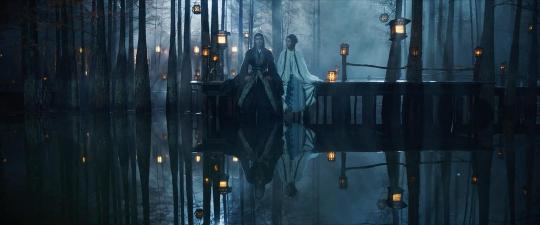
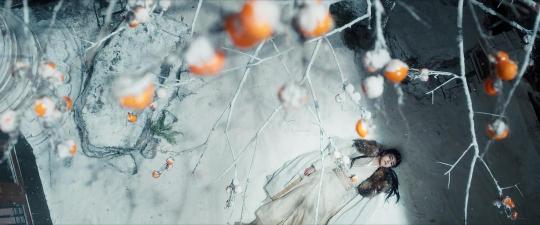
It is also just insanely beautiful. Every single shot is lovely. The costumes, make up, and hair are incredible. The casting director made all the major demons inhumanly beautiful. The sets are spectacular. The effects are nicely done. Every bit of has the vague surreality of a fairytale. The perfection of each shot ads to the manga vibe, as if we're seeing each critical storytelling panel come alive. There's recurring water-based special effects that are just gorgeous. Based on aesthetics alone this show would be worth watching to me. That it is combined with a complex, very emotional story is a spectacular gift to the watcher. A lot of the negative reviews of this complain about the staginess or that it's overly contrived in how each scene is shot. But I think it's gorgeous, works perfectly with the storytelling, and if we criticize art on whether it achieves the goal it intended then this show is doing exactly and perfectly what it means to do and doing it beautifully.
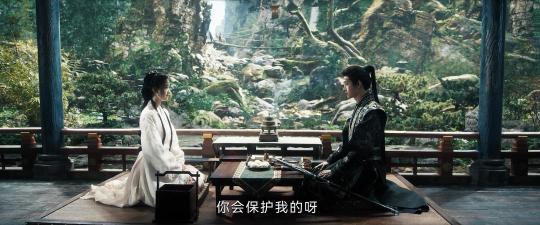

Additionally the acting is also very good, but Neo Hou is the stand out for sure. I enjoyed him in Back from the Brink, especially the later part of the story, but in Fangs of Fortune he's transformed, utterly embodying the role, the way Dylan Wang is Dongfang Qingcang in Love Between Fairy and Devil. Neo Hou has the right look, a slightly uncanny beauty perfect for a gorgeous immortal not of this world. The show does incredible things with his styling between the various looks and personas the role requires. But in acting he somehow manages to utterly transform his face and demeanor to manifest each aspect of the character as story demands changes from him.
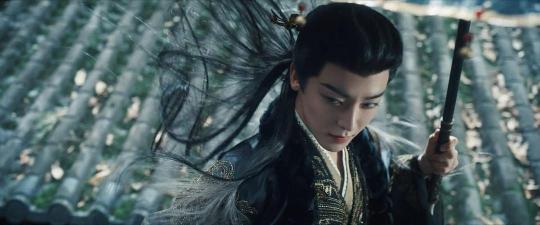
There is a lot of crying in this drama. Like early on I joked that there was going to be a character crying a single perfect tear in every ep. Lol nope. Multiple single perfect tears per ep and many outright full on sobbing scenes. This show is just waiting to rip your heart out and you see it right from the beginning. But it was such sweet pain all the way through. Just a truly engaging and utterly wrenching set of intertwined stories.
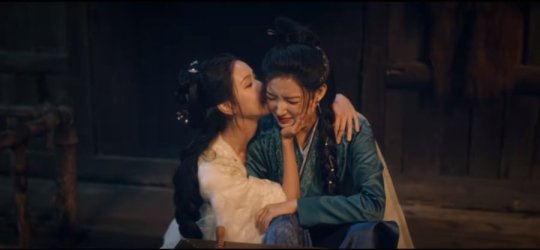
My only criticism is that the pacing falls apart in the last 3 episodes. But overall the story is solid through the end, though like so many cdramas, it's saved by the epilogue.
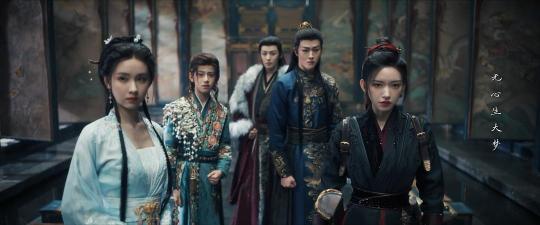
You should absolutely watch it if you want the chaotic bi polycule (it's her, her girlfriend, her boyfriend, her boyfriend's boyfriend who is also her boyfriend, their two idiot sons, and her boyfriend's ex-who is also eventually sort of his boyfriend again), or if you want your heart torn out and stomped on. Or even if you just like really gorgeous cinematic things. Also if you watch, please don't skip the ending credits, as they change as the arcs change, and the radiant joy Tian Jiarui has as he dances is an excellent antidote to the emotions of each episode.
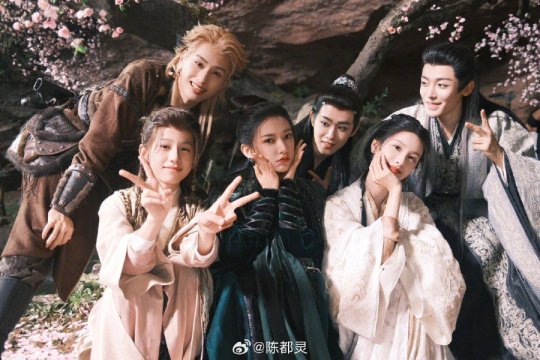
#Fangs of Fortune#大梦归离#Bai Ze Ling#cdrama#Hou Minghao#Neo Hou#侯明昊#Zhao Yuanzhou#Chen Duling#Wen Xiao#Tian Jia Rui#Zhuo Yichen#Cheng Xiao#Pei Sijing#Lin Ziye#Bai Jiu#Yan An#Li Lun#ab-HMH-mine#ab-reviews#it's really the xianxia polycule of dreams#which I didn't know to hope for until this show spoonfed it to me
357 notes
·
View notes
Text
Listen. I had fun the last time, so i'm gonna leave here another list of my Riordanverse unpopular opinions/hot takes. I hope no one is gonna cancel me:
- Throwing every single female character in the hunters is lazy writing and kinda OOC for Reyna;
- The Cupid scene is disgusting and the fact that it was made by a queer god makes it even worse;
- Jason and Nico's friendship >>> Percy and Jason's friendship. Nico and Jason were more foils than the latter and Percy will ever be;
- Leo and Nico should have been friends, and the fact that Leo was so scarred of him in HoO is wasted potential;
- Today Percy is basically the not-so-unconfirmed most powerful demigod BUT both Nico and Hazel have the potential to being more powerful than him. However, since Percy is based on Rick's own son he refuses to elaborate on it;
- Actually GROVER is Percy's best friend, not Jason, and in HoO Annabeth and Piper had a more "kinda homoerotic bromance" going on than their boyfriends ever had;
- Aside from that, Jason is clearly alive. Trow that ToA scene away;
- Nico killing Bryce Lawrence is both the most terrifying and the best scene in both PJo and HoO;
- It would have been better if Hazel and Frank were friends-crushingoneachother during HoO and started dating in ToA;
- Riordan's amatonormativity wasted the potential of many characters (like Nico and Leo) and the potential of many friendships;
- Caleo is acceptable in HoO but in ToA it fucking sucks;
- Actually it would have been interesting if Calypso discovered herself as a lesbian during ToA OR in a possible Leo's standalone novel;
- In terms of capabilities, storylines and roles in the plot Percy, Annabeth, Nico, Hazel and Reyna are Riordan's most badass characters. Others (mostly Thalia, Jason and Piper) have the potential but are underdeveloped;
- And that in my opinion is HoO biggest problem: the series has many new interesting characters (Hazel, Leo, Reyna, Jason) but they are underdeveloped in favor of 1) romance and 2) Percabeth being in the major spotlight;
- I have mixed feeling about Percy and Annabeth being part of the Seven;
- Fierrochase >>>>> Solangelo;
- Tsats is utter dogshit and it is REALLY hard to consider it canon;
- Canon Solangelo is ableist and the fact that a big part of the fandom has no problem with it is kinda disturbing. Also some fanon solangelo contents are ableist as well and it is partly RR's fault;
- The fandom basically wrote and characterized Will Solace's character. Neither Riordan or Mark Oshiro give a fuck about him, and problably that's NOT gonna improve in the Tsats sequel;
- Accusing people who don't like solangelo and/or Tsats of homophobia is like the dumbest take ever;
- RR's representation characters are a concentration of stereotypes;
- It would have been better if Piper had her self-discovering - queer storyline from the beginning of HoO. It would have made her more interesting and relatable;
- Even more, it would have been more interesting if Piper had her queer-reveal storyline in HoO THANKS to her not-so-straight chemistry with Annabeth;
- Making Nico a overly morally correct/morally "pure" character makes him less interesting;
- CJ >>> CHB;
- Nico should be a rough demigod;
- It is heavily implied that the majority of CHB STILL doesn't like Nico and they only "tolerate" him because they like Will;
- Bisexual Jason is better and makes more sense than bisexual Percy. Jason's arc is basically a metaphor of bisexuality;
- It makes me sad how RR basically throw away every other Nico's beautiful relationships (with Jason, Reyna, Hazel, even Percy..) in favor of solangelo. Nico WAS a complex and developed character, now he's kinda just "the gay one";
- With his latest works RR is ruining his own franchise;
- PJo>>>>>>MG>>>ToA>>HoO;
#percy jackson and the olympians#heroes of the olympus#trials of apollo#pjo#magnus chase and the gods of asgard#percy jackson#annabeth chase#grover underwood#nico di angelo#nico pjo#jason grace#piper mclean#leo valdez#calypso pjo#reyna avila ramirez arellano#will solace#magnus chase#alex fierro#frank zhang#hazel levesque#fierrochase#frazel#caleo#riordanverse#rick riordan#mark oshiro#rr crit#anti tsats#tsats crit
319 notes
·
View notes
Text
13 spoiler-free reasons why you should read Mairimashita! Iruma-kun
...if you haven't done so already 👀 (With "spoiler-free" I mean I'm not describing plot points or characters, but under the cut I'll discuss the overarching themes, so be warned if that's too much for you. The first 7 reasons may be enough lol)
It's both funny AND wholesome. I literally can't read it without laughing out loud, and there are a bunch of chapters that make me cry every time I read them.
It's clever! The Japanese version contains several puns based on the kanji "魔" (read "ma", = devil, demon), starting from the title, but it's a recurring pun. The English translation adapts them pretty well. Plus, there are some of the best plot twists in recorded history (IMO). And the names and characteristics of most characters are based on real-life demonology.
It's queer AF. Like, really gay. There are explicitly homoromantic relationships and several nonbinary and gender non-conforming characters. One of these is the best unashamedly nonbinary character ever written. Plus, the manga premise can be seen as an allegory of hiding in the closet. The only thing that made me uncomfortable because of cisnormativity (boys in drag as a joke) is completely fixed in later chapters, and very well so.
It's feminist, without being preachy or paternalistic. Simply put, the women/girls are three-dimensional, complex characters, as the norm should be. And there are lots of them, without it being a harem (...the harem trope is actually used as a joke).
It's spooky and adorable, imagine Halloween vibes all year round. Both main and background characters are super diverse, and if you like monsters there is stuff for you.
Most characters are neurodivergent-coded. It's basically the autistic/ADHD manga.
The art is phenomenal. It's especially good to see the improvement of the art style over the years (the first chapter was published in 2017 and the manga is ongoing). Some panels are really breathtaking.
8. The story is about personal growth - like most shounen manga, fair enough. But the protagonist, Iruma, is so far from toxic masculinity I dare say he's the antidote to it.
9. It's also about found family, the discovery of unconditional love, and trust, and healing from familial trauma.
10. It's about finding a group of friends you belong to, and transforming your weirdness into a strength, identifying and cultivating what you're good at instead of fitting into a mold.
11. It's about the beauty of learning in your own way, and the importance of education and the shaping of future generations.
12. And the reason why I opened this blog: it's about fascism and fighting against it. I mean real fascism, as in "a powerful individual/group wants society to be hierarchical and oppress certain minorities, elevating a specific subset of the population based on intrinsic characteristics which are being misleadingly treated as merits". Ethno-nationalistic stuff. More specifically, it's about being a somewhat politically illiterate person, who learns about systems of oppression beyond personal injustices. It's about questioning what is the best way to arrange society.
13. Most importantly, this manga gives you hope about the future, something I find harder and harder to have. Hopelessness is dangerous - as people without hope stop fighting. This manga makes me actively feel better. Since it's ongoing I can't ensure it will always remain that way, but I've come to trust the author enough that I expect it to.
#osamu nish my beloved#this manga was seriously life-changing for me#i can't overstate this#partially writing this post as a reference for myself#because i recommend m!ik to most people i know#so i have all the reasons in one place lmao#feel free to use this the same way#mairimashita! iruma kun#m!ik#welcome to demon school iruma kun#wtdsik#iruma kun#mairuma
473 notes
·
View notes
Text
@netflix @netflix @netflix
i’m so fucking done like what the fuck fuck fucking fuck. i was mad about 1899, because dark was so good and i wanted more from the creators. i was saddened by i am not ok with this, because i loved the characters and wanted to finish the story. i was devastated by the oa, because it was such a beautiful show and i needed to know what happened next.
but this is too fucking much. GUYS. the sandman universe is going, it’s getting more episodes and expanding. dbd made it to the top 3, that alone should automatically get it renewed. dbd is honestly one of my absolute favourite shows of all time. it’s funny and complex and has some of the best queer rep ever, it deals with important themes and has loveable characters and a beautifully realised world.
PLEASE, i beg of anyone who sees this, whether they’re a fan of dbd or not, to BLAST netflix in any way you can. tag them, message them, write to them en masse. like i’m so serious. literally write a letter by hand or print it out, and physically send it to netflix headquarters.
fucking do it, please. we cannot lose this lovely and beautiful and witty show. maybe, though the chances are slim and there are probably legal challenges, it can be picked up again by max, which was what originally produced the show anyways.

@netflix @netflix @netflix
#will incessantly posting and tagging them actually do anything to help the show at this point? unlikely.#but at the very least it’ll be mildly annoying for the social media interns and netflix as a corporation deserves that#netflix#netflix geeked#save dead boy detectives#renew dead boy detectives#dead boy detectives#dbda#edwin payne#george rexstrew#charles rowland#jayden revri#payneland#niko sasaki#yuyu kitamura#crystal palace#kassius nelson#the sandman#the endless#fuck netflix#save the oa#save 1899#starlightseraph’s brainrot
268 notes
·
View notes
Text
Sometimes I like to imagine how much of a dumpster fire the fandom of "The Platypus & His Girlfriend" could become in the PnF world.

Perryshmitz, ofc
And then, years after its run, somehow it comes to light that the entire foundations of it were stolen.
Think about the people tuning in to watch the show week to week, loving the characters and the wacky plots and the special effects, living for the constant back and forth and the complex dynamic the duotagonists have, praising how well the series did at portraying the wit that can exist between two opposite people on a long time relationship.
A beloved series with many great episodes, even though it is a widely known and accepted fact that the pilot episode is the perfect episode.
The setting, the plot, the story, the characters, the kind of humour, even the music was all so well fleshed out from the pilot that writing more was easy as pie for the writers until they finally decided to end it after the fourth successful season, but on the something anniversary of its ending, someone (maybe a diehard fan that spent a million on an auction) gets their hands on the original script/storyboard, and hey! "Doof 'n' Puss???" What a weird original name.
NO WAIT.
There's a name in there, never once has been mentioned before anywhere else, listed as creator, concept artist, costume designer, musical producer, lead actor, etc.
The fandom is divided, fights ensue between those who say it's done and it's long gone so who cares and those who think that something can be made and the creator deserves restitution. Between those who say "you can't really steal an idea" and those who argue "ideas are one thing but they stole THE WHOLE FUCKING SHOW YOU IDIOT". Between those that feel destroyed because such an important part of their lives has been tainted, their identities shattered, and those who say they should simply walk away and never interact with it again.
The news spread like wildfire.
Jeff McGarland straight up plagiarized it, never even credited the person that came up with it. Many people knew from the very beginning and everyone has to wonder: How could've nobody cared when the producer shamelessly confessed it to the director since day one? How come not ONE person pointed out that the original creator should at least receive some credit during all those years?
Later, after some long agonizing weeks in limbo they finally get a statement where the identity of the real creator comes to life and holy smokes, it was all done by a middle aged man inspired by his own freaking life experiences and his relationship with his best friend to whom he's now married, except his character was changed into a girl and his husband is an actual platypus, and at this point not only is the general fandom enraged by the shameless theft and the erasure of a queer figure from TV but it also gets filled with memes from those who cope by half-joking "THE FUCK YOU MEAN WE COULD'VE HAD FOUR SEASONS OF EROTICALLY CHARGED HOMOROMANTIC SLOW BURN???"
And then we have Heinz and Perry right there, waiting it out because what else is there to do or say?
"This was NOT my plan Perry the Platypus, I swear." he will say, and it wasn't. It really wasn't, but he's loving it all.
The mess is spectacular, and for once his art is being advocated for.
#phineas and ferb#perry the platypus#heinz doofenshmirtz#perryshmirtz#sorry you've been subjected to my ramblings. yes it will happen again#no thoughts. only blorbos#writing#doof n puss
99 notes
·
View notes
Text
I've actually been kind of wanting to talk about Coralaw for a while now and I guess this is a good excuse to do it. Anyone who's been following me since I made this blog probably noticed the transition from "all things Luffy and Zoro" to "all things Corazon and Law" (I still love zolu, for the record, but for months now I've been completely enthralled by the latter dynamic).
Click for ramblings about fandom, found family, shipping, etc.
Obviously, Coralaw is a controversial ship. But I genuinely think that, at least in western fandom, it gets way more hate and vitriol than it deserves. For months I've been occupied with exploring it from the Japanese fandom perspective, where it's actually quite popular (pixiv rankings puts it among the top 5 OP slash ships for all time which is impressive considering the amount of pairings and characters One Piece boasts overall). A statement such as "I think people ship Law and Cora without realizing it's wrong" feels ignorant to me. Japanese fans are well-aware of what kind of dynamic they're shipping, they just also know that it's fiction and don't see the use in attaching moral values to these things the way westerners do (we all know our culture is way more easily skeeved out by sexual topics and it's only getting worse with the rise of puritanical/conservative values here. But that's…not a discussion for today lol).
"Found Family" has also become a big deal here in recent years, which I used to think was great! Found Family is an amazing trope that's especially beloved by queer fans who often have shaky or nonexistent relationships with their own blood-relatives. And One Piece includes brilliant examples of Found Family themes! But more and more I see people taking these relationships and pigeonholing them into nuclear family roles that lack nuance at best and feel downright insulting at worst (no, Robin is not Luffy's mom, for god's sake!)
"Corazon and Law" has this problem, too. And in some ways, I do see them as a type of Found Family, though not really*, and definitely not "father and son". Law had a stable, loving family that was ripped away from him, and has no reason to seek to replace them. Even if he was looking for a new father figure, Doflamingo would have been the one that Law imprinted on, being the one to take him in, educate him, train him, etc. while Corazon kept his distance between occasional beatings. Corazon and Law do bond and develop something powerful during their journey but it's notably never defined. Oda certainly could have had Law see Corazon as a parental figure or perhaps an older brother (more fitting with their abrasive dynamic and the barely-over-a-decade age difference), but he never has Law use familial language like that (neither as a child or as an adult when speaking about Cora). This is likely intentional on Oda's part, because Law never fully understood what he actually was to Corazon, why this man loved and died for him. He spent thirteen years believing that there was some kind of "condition". He was a D. He had to avenge Cora by stopping Doflamingo, fulfilling his dream. Even being seen as a "son" by Cora would have been a condition, of sorts. But as Sengoku says to him, "don't try to attach a meaning to the love you received." Which is what I see all too often from fans. "Why did Cora care? Oh, he must have loved Law like a son!" THAT undermines their canon relationship. Flattens it, cheapens it. Sometimes things are more interesting when you don't try to force them into little beige boxes! And I'd be saying this even if I didn't like Coralaw as a ship because, while I do love Found Family, I've never, ever enjoyed the way people try to link relationships back to literal familial roles, especially assigning people as "parents" when they're in their mid-twenties with no business having a teenage son. What happened to role models and mentors? What happened to being friends? Granted Cora and Law aren't any of these, either. The complexity of their (canon) relationship makes it all but impossible to label and that's why it's so fucking fantastic. That's why Law's feelings are so complicated and intense and why he can place Cora on a pedestal of "savior" because Cora transcends both friend and family while simultaneously never even reaching these levels because he was taken from Law too soon. That's the beautiful tragedy *and I why I don't completely see Cora and Law as Found Family canonically, though they had the potential for it.
But what about lovers? "Lovers" can be a type of Found Family and I do ship these two, right? Well, yes, but that's a different conversation that steps outside the boundary of canon, as shipping inherently does. That's also why arguments like "X character doesn't see Y character as a lover" are so silly to me because yeah, obviously—that's kind of how it goes, especially with gay ships. They're rarely canon, they're fanon. And that's when transformative works steps in. And one reason why tragic, "what if" types of ships are especially good for this, because the AUs and possibilities are truly endless.
"It's wrong to ship these characters, even as adults, because they met when one was a minor!" Okay, but like…why? We're all aware that these characters aren't real, right? We can (and should!) explore literally any premise in fiction, even ones that some people may find uncomfortable. And yeah, I know part of my tastes and acceptance of more nuanced pairings is because I grew up in a more lawless, "anything goes" era of fandom. My shipping interests are usually very tame and vanilla but I do enjoy some weird stuff now and then, including fictional romance that pushes boundaries while also ultimately being a net positive for the people involved. There are darker takes on Coralaw but the thing that I personally like about this ship is that their genuine care for each other could naturally evolve into deep, devoted, HEALING romance, and I've always found it interesting how the portrayal of a loving and healthy relationship between these two grown men is apparently so much more disgusting than like…all the Law abuse and rape fics and artwork that exist? Like this fandom puts Law through literal hell and the ones who ship him in a relationship that would make him actually happy are the ones who get lambasted and blacklisted? Okay…
"It's a grooming ship!" Grooming is a seriously fucked up ACTION that adults take to harm children in real life. No ship is inherently showcasing grooming unless it's specifically written that way. Someone could feasibly write a fic where an adult grooms someone from childhood but that would be clear "dead dove" content and pretty obvious that the adult is being presented as a fucked up person. But people don't think beyond "proship=bad" and ignore anything else, including that most people who like Coralaw ship them as adults, usually in a more canon-compliant scenario where Corazon re-enters Law's life after Dressrosa. That's a whole thirteen years put between them and Law is no longer the teenager Cora once knew. Part of the fun is seeing how he navigates this. If romance stems from the two at that point, I really don't see how it's wrong or even that unusual (especially in the One Piece world where there have been even more questionable canon relationships than coralaw). Like, Law is a 26-year-old man and if we're going to pretend he's a real human with rights then he's WELL within them.
I know Coralaw isn't for everyone. That's 100% fine. But the constant disrespect I see, people saying CL shippers should be violently killed, we should go to hell, etc. is something I find a thousand times more detestable than any One Piece ship. Having artists I admire tell me that they love the ship, too, but could never admit it online because they fear "anti backlash" and seeing the artists who do post their work treated so disrespectfully, is just a sad reminder of how fandom has changed. Yet meanwhile the asian fandom is like the total opposite! So yeah, goes without saying that I've been exploring their stuff more. At least the ship is appreciated over there and people act like adults about it.
I guess that's it for now. If you actually read all that, I genuinely appreciate it. Thanks!
#one piece#corazon#donquixote rosinante#law#trafalgar law#coralaw#lawcora#proship#idk how else to tag this#op text
80 notes
·
View notes
Text
I don't want to get too deeply into this in a post that I would encourage people to reblog, but one main reason that Dead Boy Detectives hits so hard for me is the lack of justice.
When I was in high school, some genuinely horrific things happened to me and several other girls. Obviously, it wasn't the same since we, you know, survived. But the Bad(tm) involved a teacher who was then investigated a few years later. We all went back and worked with both the cops and the school district to try and get justice for ourselves and the other victims.
The district did nothing. They had the teacher to resign in the interests of preventing a scandal. Like St Hilarions. What happened to us didn't matter, and the school covered it up just as they covered up Charles's death.
The first time I watched DBDA, Edwin's little speech at the end of episode 1 resonated with me in an incredibly deep way. Here was a person - two people - who did not get any semblance of justice for a grave wrong. I could easily feel Edwin's deep hurt because I experience the same hurt every time I remember what happened to me. It never stops being a raw open wound that sits in your chest, and the cover-up can sometimes hurt more than even the actual event.
For the first time, in DBDA, I was seeing people who were wronged like me. More than that, though, I was seeing people seek out justice for others because they did not get it for themselves. I was seeing an alternate version of my own story play out onscreen, and both Edwin and Charles made me feel much less alone.
They still do. Those boys will always hold a really special place in my heart for a lot of reasons, but this is a major one.
And, like me and at least three of the other girls involved in the Incident at my school, Edwin is canonically queer. And his queerness is handled so well, shown positively but also just as a small part of this rich, nuanced, complex character. He feels so authentic, like someone I could have met and loved in the real world. No part of him feels like a caricature, which is a rare thing in queer media.
Seeing Netflix cancel this show and end the boys' stories in such an unjust way feels like a reopening of those old wounds. These stories matter. They have to matter.
They do matter. Charles and Edwin showed me that, because they are wonderful and special and their story is resonant and wonderful. And to watch Netflix treat this story as though it's insignificant hurts So. Fucking. Badly.
#dead boy detectives#dbda#save dead boy detectives#revive dead boy detectives#personal#ok to rb#edwin payne#charles rowland
379 notes
·
View notes
Text
I love Heesu in Class 2 a LOT. As a long time kdrama romance watcher this show appeals to me because of what it reveals about the changes happening in Korean entertainment.
This was given a true kdrama treatment with fluid group dynamics, fully fleshed out characters (and side characters!) rooted with their families and friends. Oh it's so highschool loves and crushes but also just kind friendships. I'm seeing a lot of criticism that the other friends were given importance or that some viewers don't like the time spent on familiy and extracurricular storylines but I feel that it actually elevates Heesu and Seungwon. Their story is richer because of their friendships and families. I know fans will probably just make a HeesuSeungwon cut but then their characters won't make sense. They are much fuller characters that go beyond their loveline.
Do you even see the level of care in the production? The set design, the size and complexity of the supporting staff, the variety of locations, the lack of punching down for its queer characters? I watch the end credits every episode to see the long list of sponsors. This is the kind of drama that I hope Korean kids are watching with their parents and peers. Just like Century of Love was a Lakorn, Heesu in Class 2 is a Kdrama. This is how you get engagement from others. It's not a BL made for fan girls and it's not just a queer show made with a queer lens. It's a show made with care that elevates its queer characters and queer romance so the hets in the audience root for them and see them as stars deserving of their own romance. Remember kids, representation matters to more than those in the marginalized group. I just hope this show is getting a lot of love and support. If I have to go back to the days of Personal Taste and Wedding Impossible to watch my queer characters be disrespected or settle for the short form queer shows with 5 cast members and 2 sets I will be so disappointed.
96 notes
·
View notes
Text
I guess I'm about to get real vulnerable on main here, but I saw some kinda "BookTok" disk horse cross my BlueSky feed, and it's got me thinking in a way I really can only discuss without a character limit. But it feels kind of relative to an over all trans creative experience. Maybe more specifically for us masc people, but. You know. Maybe the threads are different but the weave a similar picture. Anyway, this is kinda what my tumblr blog has become, and so here goes. Please note I also use 'queer' as an all encompassing term, as to me it is the most inclusive word I can use despite its dubious origins and history. Sorry if that upsets anyone.
The funniest thing about this whole conversation popping up was the fact that I had just been lamenting about finding the concept of 'romantasy' fun but what I'd give to find or read something with a transmasc protagonist paired with an opposite partner of any gender. Something my masc bisexual ass would love to see. Mostly because I see and support so many ones that are sapphic in nature, but hardly see any masculine. Maybe I'm not looking in the right places but Anyway. Just so happened that in the next hour I saw what I was looking for cross my Bsky feed, but with the author show casing the really nasty and negative comments he received on his concept. things like but not limited to:
"of course the transmasc character is a twink bottom" "just a girl who got a mastectomy" And other just Internalized Misogyny and Heteronormative things that affect a good portion of us transmasculine guys.
And idk, man it really struck a nerve with me.
If only because first and foremost, the author is writing something he wanted to see. Filling a niche and void he wanted to see realized, and like so many other authors' works, in a way that feels personal to him. And to attack it in such a way was pretty vile.
Queer stories and creations in of themselves are personal stories, because we write from our own experiences, and put them in our original works whether subtly or not so subtly. It's there, and you can't separate the queer experience from a queer work because by its very nature its queer. But also like, that experience isn't the same for everyone. And we shouldn't expect it to be. So, no, not every work is going to be what you want or associate with. But we should be uplifting all of it so that someone with an idea or concept that does speak to you will have the confidence to bring it to the table. And yeah. Unfortunately, that sometimes means that cliches are gonna happen. That twink ass transmasc might end up being a bottom 75% of the time.
But it also like, led me to associate my own struggle of accepting my own body and transness and some of my own preferences in the bedroom.
I'm not saying that all writers, artists, or creators are using their method of making art to explore their own hang ups with their gender and bodies, navigating this absolutely messy and strange world of norms and expectations while simultaneously seeming to want to turn them on their head. Gender is complex. Being trans is complex. And it gets weird, and sometimes we need outlets to work our way through it.
But also, most of us transmasc people have vaginas. It's just a fact of life. We've got a big ol' gaping axe wound of an organ sitting between our legs and for a lot of us, it still feels good to stick something in it, and we shouldn't be ashamed of that at all. And hell, a lot of us are short, considering our genetics are wired that way and no amount of HRT is going to change the fact some of us aren't going to get past 5'5". But sometimes, especially with what is expected to be masculine by gender norms, and the physical form of a cis male body, it can sometimes be really hard to reconcile that.
I know it was for me. To the point where I often struggled with my sexuality and my relationship with intimacy about it for a long time.
I made my character Akihiro while I was, and still am parsing through a lot of my own dysphoric issues, and paving my own way to acceptance. And that's made him a deeply personal character to me. And he has grown and changed as I project a lot of those issues on to him and his development. Akihiro has been an exploration of myself as much as he is an an original character that I role play. But not so much in the ways of personality, but more in the ways of the challenges with which he is presented and has to navigate himself.
Akihiro is a trans man in a world that is accepting of it. Society has progressed past these petty and arbitrary standards. But he becomes a cyborg at a time where the question is instead what it means to be human, and so...The aspect of depersonalization, dysphoria, and depersonalization he experiences at the hands of transhumanism is not so different than what I have and do experience in my own transition.
Akihiro wasn't always trans. That was honestly a pretty recent development and one that I did struggle with making. And I realized I was struggling with it because of those same dysphoric issues. And I just needed to let them go.
It was reflected in another recent development; the way that I had Akihiro handle his genitals when he was presented with the option to upgrade from none to a functioning set. And he chose to go with what he had been born with, the genitals he had when his body was mangled. He went with a vagina. Because he wanted to embrace the body he had taken for granted before he lost it, and not some idealized version of himself he could have obtained at any point prior.
And yeah. He 'bottoms' the majority of the time for his boyfriend because he enjoys it. But it doesn't stop him from topping him either, nor enjoying that. Nor had it stopped him previously from being intimate with other men and women. And that's his preference as a character.
And who are we to say it wasn't the same for this author? Where he is putting his feelings and acceptance of his own body and desires onto paper? And that is being met with such vitriol because it's not someone else's idea of what is masculine, or whatever. I don't know. Maybe they weren't. Maybe they did just wanna write some twink ass boy getting dicked down and like, that's fine too. Why do we have to be so mad about that?
And maybe this was just a lot of words to say that I think we get so wrapped up in words and labels for things that it completely erases the nuances of our own experiences and it turns right back around to being so queerphobic and limiting. And we don't give ourselves, much less other people, the grace to create the things they want to, and from a place of their own experience and desire. It's harmful.
#long post#azrael.txt#the transmasc struggle I guess#oh and booktok drama?#rambling about my OCs too#Akihiro is v important to me ok#holy shit this post got away from me.
88 notes
·
View notes
Note
When it comes to problematic content in QL, everyone has different tolerance levels, and different definitions for it. For you personally, how much is too much? And given that some of your faves/constant rewatches may not have aged well, do you adjust your tolerance as you go, do you just ignore it/tune it out, or do you watch, cringe, and carry on? Does problematic content make you lose love for something with time?
Hum, complex question.
I guess it's usually context and origin for me. Like I forgive Japan stuff I won't take from Thailand because it's... Japan, kinky and boundary pushing is what they do. I don't always like it, but I will usually watch it. I understand their POV and style. And more importantly, so do they.
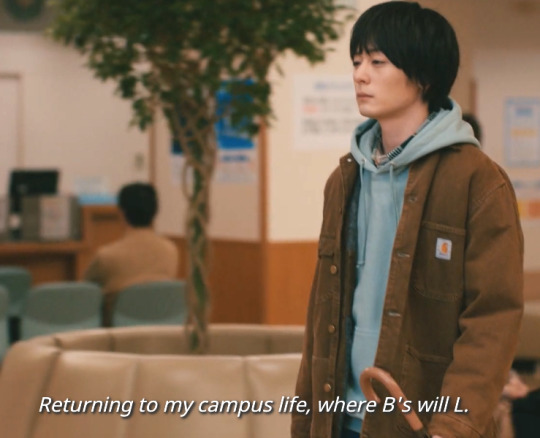
Certainly that has to do with how well established Japan is both in BL and as a film industry. But there's something more going on. They usually have something to say when they trigger, something thoughtful and provoking about culture, or queerness, or the BL genre.
Where as Thailand doing something similar will come off as clumsy and puerile, like they are teens who don't know any better and are just poking at their audience to see what kind of reaction they get. Or worse, don't even realize when they make a misstep - they just needed it for plot or are executing a tired trope.
I want finesse with my abuse!
I don't mind being manipulated, but I can't catch it in the act. I need to notice it after, and then I make tiny clapping noises.
For me too much is often when it's too predictable in the wrong way, or when it's poorly executed. Like rape just for a plot point. Or lack of consent when it makes no sense for either character or story arc.
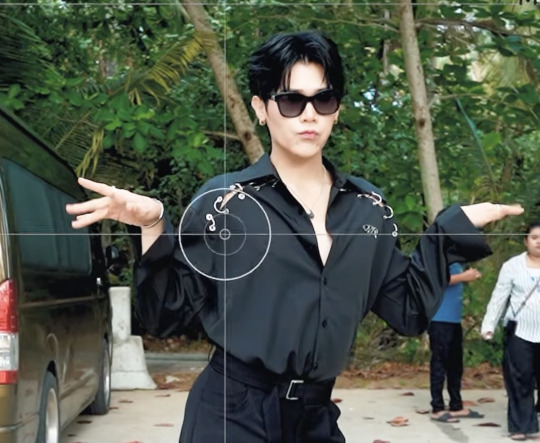
I don't like it when poor writing hits me up side the head. Like (and I will harp on this forever) did he have to steal that key and break into his hotel room? Did we all have to overlook it and think, for some reason, that was okay? It wasn't necessary for the plot. It was lazy writing.
I hate lazy writing.
I'd rather bad writing.
How do I put this?
If Japan had done that, it would have been some weird creepy edgy stalker aspect to the seme's character and it would have been purposeful. The dirtiness of it would have been part of characterization. Undies would have been stolen. The lens would have told us to find it off-putting. It would have been done with intent.
Thailand's lens often makes bad/stalker/creep behavior seem normal or acceptable.
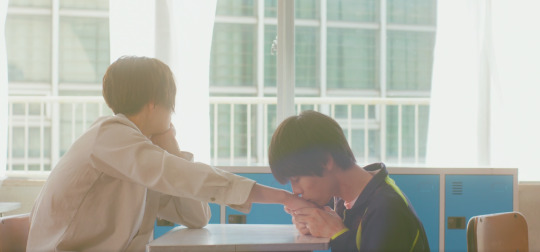
If Japan reads your private journal we, the audience, will all know how gross that feels. The grossness will be part of the creepy kinky plot. If Thailand does it... it's just passed over as fine. Or worse, romantic.
Japan does its violations with intent. Because they like the edge. They want to make us a little bit uncomfortable... at all times.
Thailand does it with a blunt butter knife and expects us to overlook a character flaw.
Back to your question...
So given it's a BL producing country that I know is clumsy about this (like Thailand) sometimes I notice and get annoyed, and sometimes I sigh and it doesn't bother me. Often that has to do with my mood. Sometimes it's the chaos of the show. Like with say Pit Babe, or The Sign, eventually I'm just overwhelmed by the absurd crazy of it all. Probably because they clearly aren't taking themselves seriously, the whole darn show: cast, crew, production, everybody.
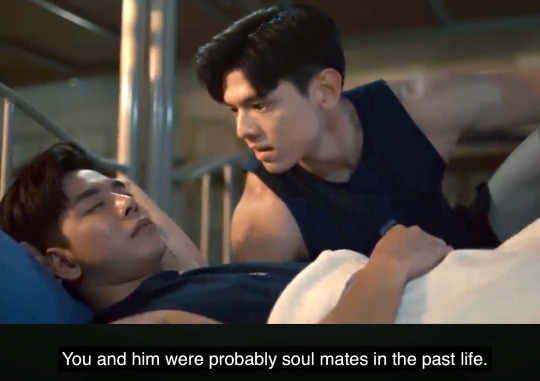
Sometimes the violation in question is simply not a trigger for me so I don't mind.
Sometimes it reads as a kink and then I kinda like it (Taiwan will do this a lot).
Sometimes I don't even notice.
Yes, certainly I have dropped show or moved on from rewatching older stuff because now it bothered me, where once it did not (cough cough TharnType).
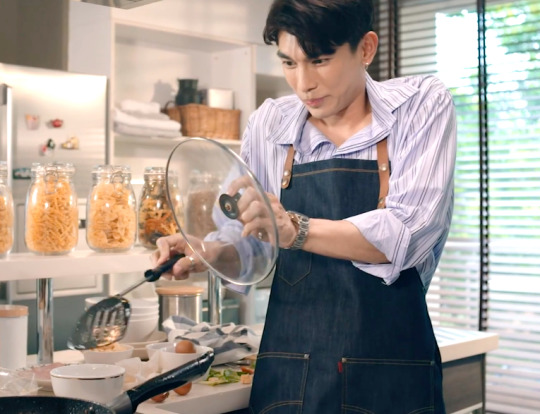
But others I still understand (if not love) because they say something about the time they were made and what the genre was then, like Takumi-kun.
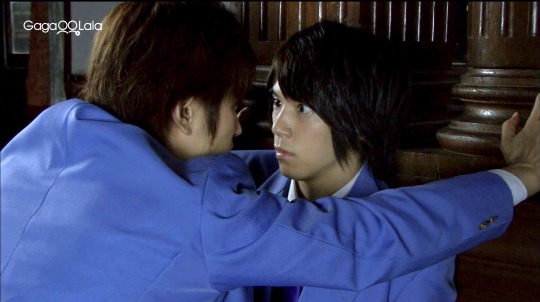
Some stuff I loved so much when it first aired and still love with such nostalgia that I don't really see its flaws. UWMA is likely one of those. It's always great to me, even on rewatch, even after 810 other shows.
But I think UWMA might not be great to someone who started watching BL in 2022 or comes to the genre out of Korean BL, for example.
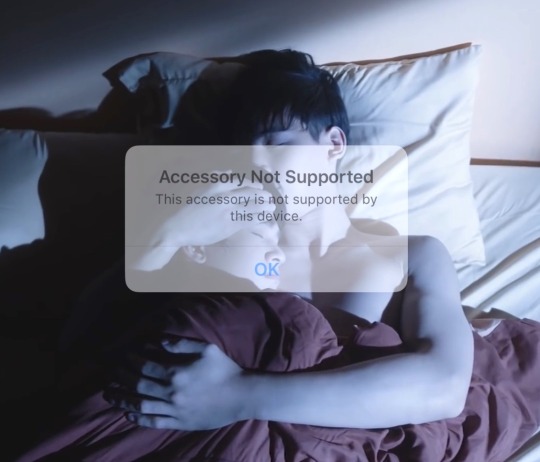
Does problematic content make you lose love for something with time?
Sometimes but not always.
It's all in the nuance, I guess. Mine, what I bring to the show, my willingness to understand its origin and forgive it its sins, but also the show's nuance and its execution of story.
(source)
#asked and answered#a philosophical intent#the nature of lens and point of view#nuance#thai bl versus japanese bl#tharntype#takumi-kun#problematic content in bl#triggering content in BL
69 notes
·
View notes
Text
unpopular opinion: marauders fans have ruined the character of regulus black and severus snape. regulus is a right-wing, pure-blood supremacist who values his house-elf life more than muggle life. he's not a poor little boy, but someone radicalized(he has admired voldemort from a young age and neither of his parents are death eaters.), in line with his family's ideals. he's an interesting character, but he's not a kind or good person.
you don't like snape for what he did during the golden trio (which, in reality, in the context of a 90s "private" school, isn't particularly shocking. sorry, but the durleys wanted to send harry to a school that caned children) or the fact that he once insulted lily? okay, whatever you want, but by being a spy, he risked his life (and died) for voldemort's downfall. and regulus is a supremacist so overall i'm not sure he was using "muggleborn"
the reality, apart from the fact that you are hypocrites (who for the majority have forgotten that canonically the poor kid who was bullied by a gang of mostly rich and popular kids was severus and not someone else) you prefer to replace severus snape with a bad copy (by distorting a character who could be complex and worth studying)
regulus is easier to like: he's almost empty canon-wise, more handsome than severus, and dies early enough for us to forget he's also a magical n@zi
the ridiculousness no longer has a name when i come across posts saying that lily evans was best friends with regulus black
YeS bUt It'S fAnOn- yes but it remains just as ridiculous (especially with the aim of wanting to demonize a canonically gray character to babygirlized another). the canon is only useful to you for taking down snape, the rest of the time you prefer to forget about it-
you could have made a real bad character who realizes that the world is not as he thinks it is.
(yes, even if you're not ready to debate: snape is one of the rare characters who has physical traits reminiscent of the regions of swana.)
ps - snape isn't a particularly good person, but he's not the devil some marauders like to portray
ps2 - rab has a "redemption" but it doesn't erase who he is (or at least as much as snape's "redemption" doesn't erase his complexity)
ps3- at worst, you can celebrate whatever you want, but honestly, with your comments on snape, I'm scared of what you're like in real life. you look a bit too much like my school bullies who picked on me because i was weird, queer and mixed race (+ dressed strangely).
89 notes
·
View notes
Text

This is a letter for those who need to hear it.
It’s been months since Arcane ended, and I have never witnessed such sustained hatred toward a fictional character as I have toward Caitlyn Kiramman.
Caitlyn wasn’t just a character to me. She was my comfort, my escape, someone I grew up with. I mained her in League of Legends. She was the one I turned to when I needed solace from stress, when I needed an outlet, a sense of stability. And when Arcane gave her a voice, a backstory, and a presence that was complex, human, and real—I saw myself in her. I felt her.
A queer, Asian woman. Reserved but fierce. Composed on the surface, yet deeply emotional. Someone who loved, who lost, who tried to do good in a broken world. A woman who made mistakes, who questioned herself, who cared—truly cared. For justice. For love. For people.
And then the world turned on her.
People called her things I can’t even believe we’re still repeating— A Nazi. A fascist. A KKK member. A Trump clone. White-passing. They posted violent fantasies about beating her until her hair turned red.
They erased her Asian features in fanart, and then denied she ever had any. They claimed she wasn’t Asian at all—despite confirmation from the creators. They shipped her with an abuser—a man, solely to antagonize lesbians, erasing her queerness for a cruel joke. I could list a hundred more violations against her character that had no basis in canon, no connection to the person she was written to be.
And all of this—for what? For simply existing as a complex, queer woman? For being canonically loved by another woman? For not fitting into their biases or preferred narrative?
It hurts. And it frustrates me. Because she can’t defend herself. She’s fictional. But she was written with care. With intent. With love. And that doesn’t protect her from being demonized by people who have no interest in truth or nuance.
Why do you think people still defend her? Why do so many of us continue to speak for her? Because for some of us, she’s more than just a character. She’s a reflection. A mirror. A rare piece of media that finally saw us.
As a queer, Asian survivor of abuse myself, I am far more triggered by people fantasizing about brutalizing a character I relate to than I ever was by a scene where that same character throws a miniature boat in a moment of grief, guilt, and self-loathing.
Some people don’t understand what it means to truly care about a character. What it means when a piece of fiction finally sees you, speaks to you, gives you something soft and strong to hold onto.
So no—I won’t apologize for defending Caitlyn. She may not be real. But what she represents? Absolutely is.
134 notes
·
View notes